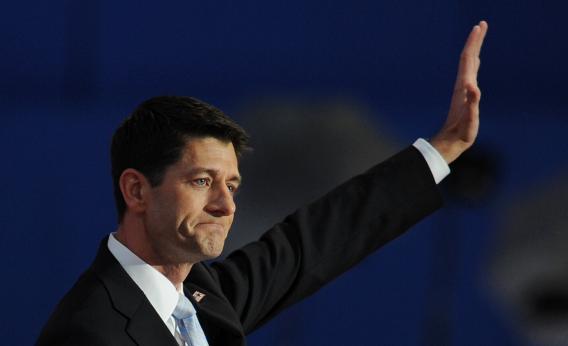Paul Ryan’s speech last night was built substantially around willful distortions of the facts, as recounted by my colleague David Weigel. And certainly if Will Saletan was disgruntled by Ryan’s Medicare flim-flam yesterday morning he can’t be happy now.
But floating above all that is a larger theme, that I also think is wrong, but in a more interesting way than blaming Obama for the closure of a General Motors plant that actually closed when George W. Bush was in office. This is Paul Ryan’s vision of the big choice in the election. Now don’t get me wrong. The choice is a big one, as are most presidential elections. Politics is important stuff and the stakes are pretty high. Still, post-1970 American politics basically always gives you the same choice. In Column A the market liberalism of the Republican Party and in Column B the social liberalism of the Democratic Party. But Ryan sees instead an apocalyptic clash between freedom and tyranny:
None of us have to settle for the best this administration offers — a dull, adventureless journey from one entitlement to the next, a government-planned life, a country where everything is free but us.
That’s a far cry from the complaint that the Obama labor market recovery has been too slow. In essence Ryan wants to run against Communism. And what better thing for a young man with a taste for Ayn Rand novels to aspire to than to some day be able to deliver the basic case for market capitalism before a live national television audience? But as Ryan somewhat awkwardly reminded us with talk of his iPod playlist, he’s far too young to make a career as a cold warrior. So rather than calming down, he’s arbitrarily decided to imbue the debate between spending at 18 percent of GDP and spending at 22 percent of GDP with the moral weight of the Berlin Wall.
The issues just won’t bear that weight. The system that prevailed in the Cold War isn’t pure type libertarianism out of Atlas Shrugged. It’s regulated welfare-state capitalism. When the U.S. auto industry is on the verge of collapse, House members who have GM plants in their district vote for the bailout to try to save the company. When the president of the United States implements the bailout in a way that doesn’t happen to lead to the reopening of some specific plants, the House members whose districts lose out get upset. When the elderly overwhelmingly favor one political party over its stances on social issues, that party tends to stand up especially tall for the aspects of the social-insurance state that benefit that cohort of people. Earlier in the evening we were introduced to Steve Cohen, a small businessman from Ohio, who thundered on behalf of free markets and against Obama’s overweening regulation before calling for stronger patent protections. Republicans favor large systematic bailouts for farmers afflicted by bad weather.
It’s all a bit hypocritical, but what it is most of all is politics. Banal workaday democratic politics in which politicians hustle to advance the interests of their coalition of supporters, with the shape of the coalition determined in part by broad ideological themes and in part by happenstance. It’s important work and it matters. But it’s not the Khruschev/Nixon debate. When the people of West Berlin were faced on a daily basis with East German tyranny just a few neighborhoods away, they turned at times to center-right Christian Democrats and at times to center-left politicians like the SPD’s Willy Brandt. The people who brought you Medicaid, food stamps, Title I education assistance, the Environmental Protection Agency, and the federal student loan program were all on the anti-Communist side of the Cold War. Keynesian fiscal policy is an alternative to the view the capitalism is inherently crisis prone and unworkable.
You don’t expect practical politicians engaged in a political campaign to deliberately call attention to what they have in common. But over the past two days I’ve watched a lot of totally made-up disagreements with the Obama administration. And Ryan’s dark warnings of a centrally planned dystopia if people below the age of 66 enjoy the same kind of regulated subsidized health insurance that Ryan favors for people over the age of 66 just don’t make sense.
